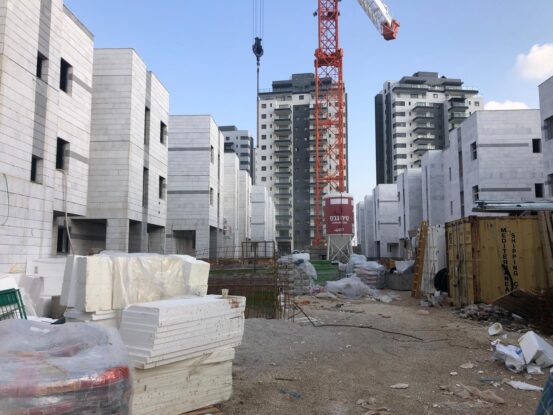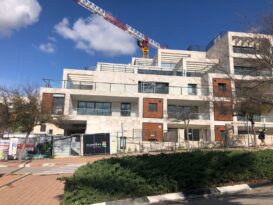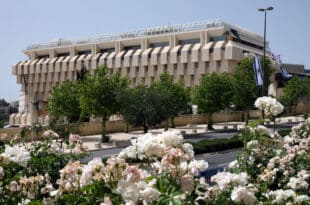The Israel housing market showed mixed signals in March 2025, with total apartment transactions—both new and secondhand—rising by 8% compared to the previous month. Yet beneath this uptick lies a continuing slowdown in new home sales, especially in the free market, where contractor activity remains weak. The decline, which began earlier this year following a VAT increase, persisted into March. At the same time, developers rushed to offer aggressive financing incentives ahead of new Bank of Israel restrictions—pushing such perks to a record 34% of all contractor sales.
By Dror Neer Kastel, Nadlan Center
In March 2025, a total of 8,012 new and secondhand apartments were purchased in Israel, including 774 units bought through government-subsidized programs. This marks a 2% decrease compared to March 2024, but an 8% increase from the previous month, according to a new report by the Ministry of Finance’s Chief Economist. First-time home purchases, however, declined for the third consecutive month—something that hasn’t happened since the beginning of the war.
Excluding subsidized units, there were 7,238 transactions in the free market in March—1% less than the previous year, but 9% more than the previous month. Despite the relatively mild annual drop, there were stark differences between new home sales and secondhand transactions in the Israel housing market.
Including government-subsidized homes, contractors sold a total of 3,133 new apartments in March. This marks a 17% decline compared to March 2024, continuing the trend of steep drops of 21-23% seen in the first two months of the year. That being said, it shows an 8% rise in purchases when compared to February. In the free market, contractors sold just 2,359 units in March—a 21% fall from the same time last year. This follows a similar decline in February and an even sharper 30% drop in January, which was largely attributed to a spike in purchases in December ahead of a VAT increase). Still, this figure reflects a 9.5% increase from February.
The share of new apartments purchased “on-paper”—before construction begins—stood at 67% in March, up 5% from February and back to January’s high. This is a 4% increase compared to March of last year.
Financing Perks Surge Ahead of New Bank of Israel Restrictions
Following earlier analyses by the Ministry of Finance, March saw a sharp nationwide rise in developer financing incentives—especially in Netanya, Hadera, Be’er Sheva, and Tel Aviv. While such incentives accounted for 29% of free-market new home sales in February (including units for immediate delivery), they climbed to 34% in March.
In the Netanya area, financing incentives were offered in two-thirds of all new apartments sold by contractors in March—up from 28% in November—for units with a delivery date at least one year from the signing date. When considering all new apartments sold, including those available for immediate delivery, the rate stood at 57%. In Hadera, the rate reached nearly 70%, while in Be’er Sheva and Tel Aviv, it stood at 60% and 36%, respectively. One of the cities that stood out was Herzliya, in the Sharon region, where financing incentives were particularly prevalent—driven in part by multiple new project launches in the Galil Yam neighborhood and the recent lifting of restrictions on free-market sales by “Mechir LaMishtaken” buyers.
The central region was the only area where financing incentives declined in March. The Ministry of Finance attributes the national uptick to developers rushing to offer deals ahead of expected restrictions—which were imposed by the Bank of Israel on March 23. According to the Ministry’s analysis, many developers are now affected by the Bank of Israel’s new restriction on projects where over 25% of the units are sold with financing incentives.
Investor Activity Boosts Secondhand Sales
Investor purchases in March totaled 1,218 units—a 5% decrease from March 2024, but a 10% increase from February. Investors accounted for roughly 15% of all transactions, similar to February but slightly below March 2024. Of these purchases, 45% were new homes—2% less than February and 7% less than the the previous March.
Investor sales, however, jumped to 1,614 units—a sharp 22% increase compared to both March 2024 and the prior month. According to the Ministry, this explains the rise in secondhand home transactions within the Israel housing market.
First-time homebuyers purchased 4,375 apartments in March, including subsidized units—a 5% drop compared to March 2024. This marks the first time since the war broke out in October 2023 that this segment has seen three consecutive months of decline when compared with the same period in the previous year. Compared to February, however, purchases were up 11%.
Buyers upgrading to larger or more valuable homes purchased 2,419 units in March—up 7% from a year earlier. This was the only segment to show annual growth in March, continuing the 12% rise recorded in February. The share of downsizers—those moving to smaller or less valuable homes)—was 28%, slightly lower than February but 8% more than in March 2024.
In conclusion, the Israel housing market continues to show mixed trends—overall transaction volumes are rising, but contractor sales and first-time buyer activity remain weak.

Nadlan Center is Israel’s leading real estate news and knowledge platform in Hebrew, created for industry professionals. Founded by experts in the field, it delivers in-depth, up-to-date coverage on urban renewal, planning and construction, taxation, and housing policy — tailored to the needs of developers, investors, planners, and financiers. In addition to its widely read news content, Nadlan Center hosts major industry events, professional conferences, and training programs that support the growth and development of the Israeli real estate sector.
Learn more: https://www.nadlancenter.co.il







